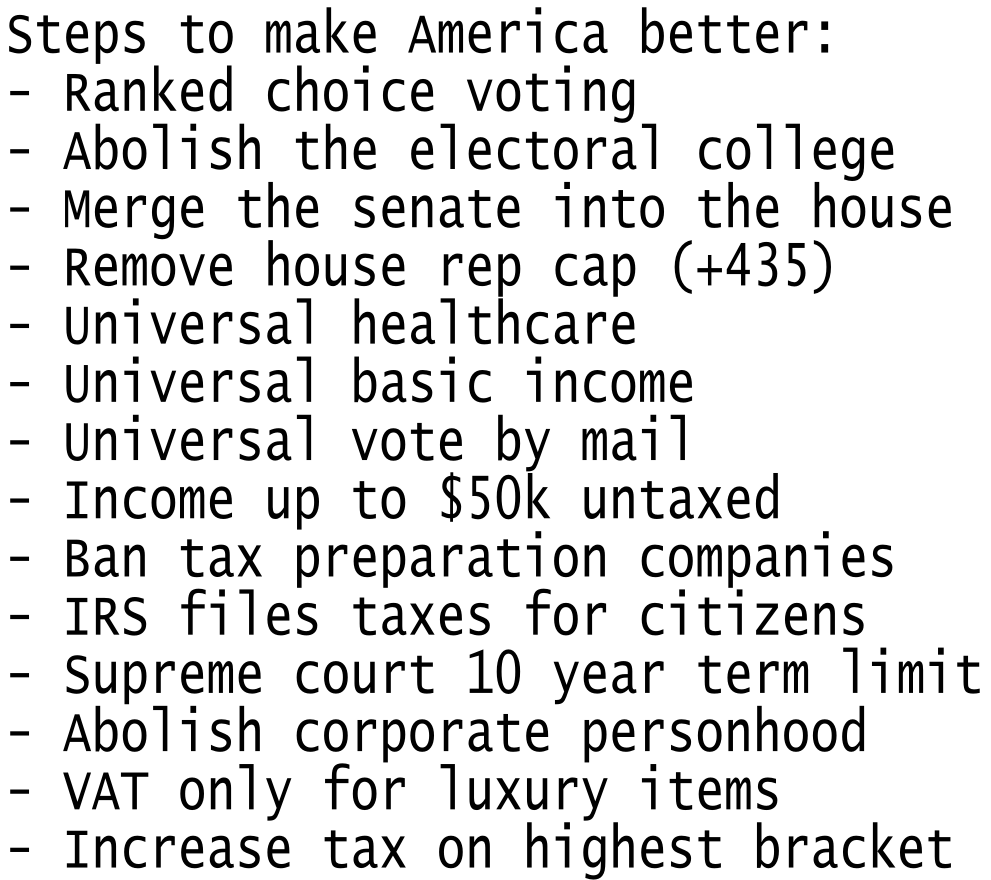this post was submitted on 07 Mar 2024
992 points (91.3% liked)
General Discussion
11946 readers
7 users here now
Welcome to Lemmy.World General!
This is a community for general discussion where you can get your bearings in the fediverse. Discuss topics & ask questions that don't seem to fit in any other community, or don't have an active community yet.
🪆 About Lemmy World
🧭 Finding Communities
Feel free to ask here or over in: [email protected]!
Also keep an eye on:
For more involved tools to find communities to join: check out Lemmyverse and Feddit Lemmy Community Browser!
💬 Additional Discussion Focused Communities:
- [email protected] - Note this is for more serious discussions.
- [email protected] - The opposite of the above, for more laidback chat!
- [email protected] - Into video games? Here's a place to discuss them!
- [email protected] - Watched a movie and wanna talk to others about it? Here's a place to do so!
Rules
Remember, Lemmy World rules also apply here.
0. See: Rules for Users.
- No bigotry: including racism, sexism, homophobia, transphobia, or xenophobia.
- Be respectful. Everyone should feel welcome here.
- Be thoughtful and helpful: even with ‘silly’ questions. The world won’t be made better by dismissive comments to others on Lemmy.
- Link posts should include some context/opinion in the body text when the title is unaltered, or be titled to encourage discussion.
- Posts concerning other instances' activity/decisions are better suited to [email protected] or [email protected] communities.
- No Ads/Spamming.
- No NSFW content.
founded 1 year ago
MODERATORS
you are viewing a single comment's thread
view the rest of the comments
view the rest of the comments

You missed a very important one, fix the main reason billionaires don't pay any tax:
Using your unrealised gains (e.g. shares) as collatoral to take out loans should be considered realising those gains and thus subject to capital gains tax
And while we’re at it, let’s take into account the total wealth of your stock holdings when you realize gains. There’s no reason poor and middle Americans should pay the same tax on their capital gains as billionaires.
Oh god yes
Why stop there? Why keep the stock market at all? It's only real purpose is for the rich to play games with their wealth, to distribute wealth towards themselves, etc. People shouldn't be making a living off of speculative investment at all. Jobs should contribute to society. Owning is not a job.
I'm pretty sure if you got rid of "the stock market" it would immediately be reinvented.
"Hey, I need money to start my CatChat app. If you invest, I'll give you part of the company"
"Cool."
"Hmm.. I bet I could sell parts of this to the public the same way"
Maybe the worst parts wouldn't be reinvented right away, but those are the things that need to actually go. High frequency trading, weird nonsense that's not actually creating value, etc
Maybe ban the derivative stuff like futures and bonds. No high speed trading, buying stock is like buying a handgun and has a waiting period.
Banking is a racket, make it public.
Insurance is a racket, make it public.
100% tax above 999,999,999 on any and all assets owned by a single entity.
Yeah, there would be a risk of that happening. But to prevent that, the existing concept of ownership in a company needs to change as well. All companies should be legally required to be 100% employee owned, no other form of ownership allowed.
The switch away from a stock market wouldn't be simple, and it would probably be quite painful. But absolutely worth it.
That's an interesting idea. I've found personally that every time I've worked for a publically traded company I've hated it because everything is just about increasing share price no matter what. OTOH I think investment is very useful for progress though... I'm not sure how investment would work without ownership
This matches my experience quite well. I'm currently working at a place that isn't traded publicly for the first time ever, and it is significantly better. Granted, it isn't perfect, I still have plenty of criticisms that are separate issues. And many of those issues could be solved/lessened by workplace democracy, but that's a different conversation.
End goal would be at most investment works through loans. Somebody has a business and wants to expand, or wants to start a new one? Get some loans, and the interest is how you would "invest". I am sure there would be loopholes around this to end up with lots of stupidity, but it would be a better system.
It would be a lot slower growth though. And IMO that's a good thing given that the planet is on fire. Policies and institutional changes that will lessen our impact on the environment is a good thing. We ultimately need de-growth to an extent, and slower growth at a minimum.
The bigger issue here is how to abolish a stock market. When investors catch wind of this happening, they'll sell as hard and fast as possible, and move their wealth to overseas stock markets. A slow and steady abolishment would probably make it a bit better, but it's probably worth a scientific study or twenty to look into the long term effects/potential solutions for this.
The worst part is unrealised gains from selling shares you don't own? Until a company is bankrupt? But then keep that company alive as a zombie so you never have to pay any tax or explain how you sold more shares than existed? See Sears and toys r Us.
I like this. If you use something as collateral, then it means the lender has assigned some amount of value to that thing and now you have a number that you can apply taxes to.